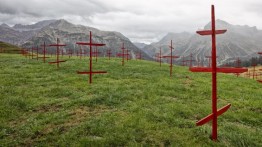Professor Diane Lewis to Participate on Frederick Kiesler Panel at ACFNY
POSTED ON: March 30, 2015

ONA B., The Hay is Already Dry in the Mountains, 2014, C-print, Unframed 37.4 in x 76.8 in, Courtesy of the artist
Diane Lewis is a panelist for Display of the Centuries: Frederick Kiesler and Contemporary Art held at the Austrian Cultural Forum New York on March 31, 2015. Lewis was awarded the grant “The Young Kiesler Award” from the Kiesler Foundation in 2013 toward the publication OPEN CITY: Existential Urbanity.
The panel talk is moderated by Bettina Zerza (ZERZA Architects) and features:
Hani Rashid (Asymptote Architects)
The panel discussion is in conjunction with the group exhibition "Display of the Centuries: Frederick Kiesler and Contemporary Art" at the Austrian Cultural Forum New York. The exhibition is dedicated to the work and ideas of the Austrian American architect, designer, artist, and theoretician Frederick Kiesler, as 2015 marks the 50th anniversary of his death, his 125th birthday, and the 50th anniversary of the completion of his most famous work, the Shrine of the Book in Jerusalem.
View invite here.




